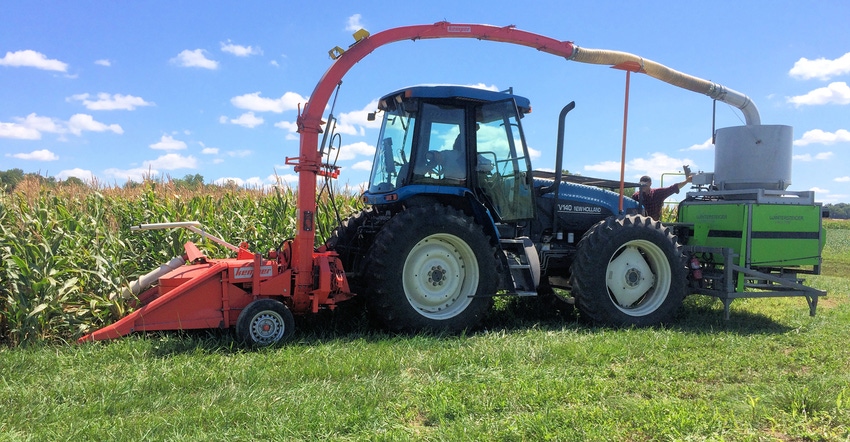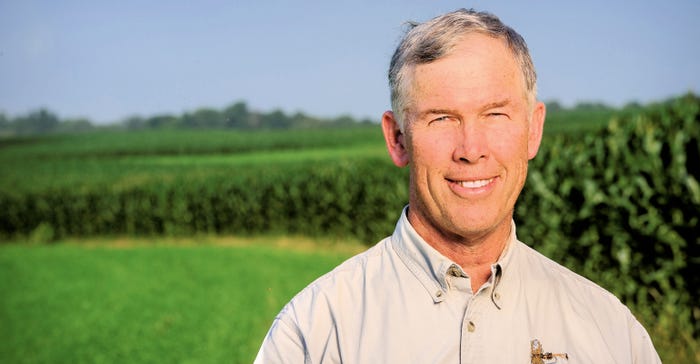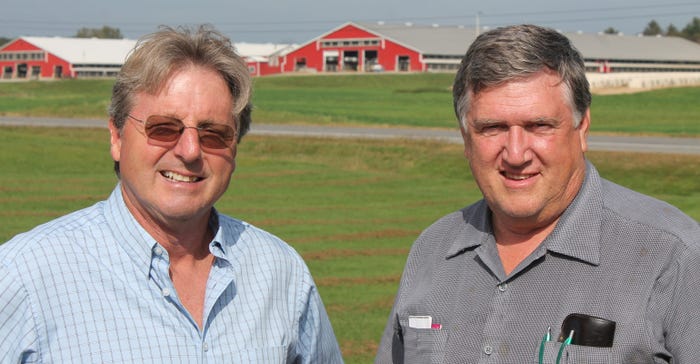October 3, 2017

Necessity spurs innovation. It clearly spurred revival of Cornell University’s commercial corn silage variety testing program. And, good news: 2017 harvest results will be available soon.
Cornell’s Pro-Dairy Director Tom Overton successfully developed a multi-partner effort and secured 2016-2017 funding from New York Farm Viability Institute to revive the testing. It had briefly lapsed due to retirement of Bill Cox, a longtime Cornell researcher.
In 2016, eight companies provided seed to plant hybrids in three maturity groups. They were tested at Musgrave Research Farm near Aurora in New York’s Finger Lakes region and at Greenwood Dairy near Canton in northern New York.
Seed company participation doubled for the 2017 trials. And, a western New York farm site and Willsboro Research Farm along Lake Champlain, plus a Vermont location collaborated by University of Vermont’s Heather Darby, were added.
A milk-money generator
“High-quality forage seed selection plays a part in maintaining our herd average of 29,000 to 30,000 pounds of milk per cow,” says Willard DeGolyer of Table Rock Farm, Castile, N.Y. Table Rock feeds corn silage and hay silage as 58% to 60% of forage dry matter.
 MUST-HAVE DATA: “Research by the university as an independent third party is absolutely critical,” emphasizes Willard DeGolyer.
MUST-HAVE DATA: “Research by the university as an independent third party is absolutely critical,” emphasizes Willard DeGolyer.

His corn hybrids are selected based on the Cornell data. “I study the data from all trial locations and across multiple years with a closer look at the site nearest my farm,” he explains.
Like DeGolyer, Kevin Acres of Madrid, N.Y, trusts the data to make a difference in cow milk production. “Corn variety research makes me money,” adds this milk producer. “The data sometimes shows 2 tons or more difference in silage yield and a wide variability in digestibility among the hybrids.”
Acres reviews data from nearby Greenwood Dairy, which has hosted corn grain and silage variety trials for several years through Cornell and the Northern New York Agricultural Development Program. “The trials provide a realistic ‘selfie’ on how a particular variety performed in my neighborhood, with my weather, and within the same soil types and latitude,” he adds.
 IT’S MONEY IN THE MILK TANK: Hybrid trial data from plots at Greenwood Farms has helped significantly boost corn silage and cow performance say Kevin Acres (left) and Jon Greenwood.
IT’S MONEY IN THE MILK TANK: Hybrid trial data from plots at Greenwood Farms has helped significantly boost corn silage and cow performance say Kevin Acres (left) and Jon Greenwood.

Jon Greenwood started hosting trials “when they used to say we couldn’t grow good corn here. Now the trials show the northern New York region often has top yields.”
How top performers are rated
The Cornell Net Carbohydrate and Protein System analysis is used to better evaluate the hybrids’ milk-production potential. It also accounts for differences in total ration dry matter intake potential based upon hybrid selection.
CNCPS factors in each hybrid’s nutrient and digestibility characteristics, explains Joe Lawrence, Cornell Pro-Dairy forage systems specialist. It shows how they would impact a diet developed for a second-lactation dairy cow to produce 100 pounds of milk per day with forage as approximately 60% of diet DM and corn silage approximately 70% of forage DM. Fiber digestibility plus corresponding predicted dry matter intake drives how much forage can be in a cow’s diet, he adds.
“Optimizing corn silage quality is paramount for dairy producers,” emphasizes Cornell’s Overton. “These revitalized trials now serve as a platform for broader corn silage-focused research. We’ve already seen the value extended through additional funding.” New York Corn and Soybean Growers and NNYADP, for instance, are funding research on mycotoxins in silage samples.
Hybrid entry fees will be the primary funder of future trials. Current hybrid funding has clearly demonstrated the data’s value, says David Grusenmeyer, NYFVI executive director. And he adds, “I’m pleased to see the program become self-sustaining.”
2017 silage trial data will be available before year-end, possibly in November. Watch scs.cals.cornell.edu for results. For more information, contact Lawrence at 315-376-5275, or email [email protected].
11 tips for interpreting corn silage trial data
Once you have corn silage plot data in front of you, the scrutinizing begins. Consider these corn-picking pointers provided by Overton and Lawrence, plus Allison Lawton, Cornell research specialist, and Margaret Smith, plant breeding and genetics researcher:
• When possible, select hybrids based on multi-year and multi-location data.
• Look beyond a hybrid’s basic ranking into growing conditions, soils and agronomic practices influencing that performance.
• Look for characteristics that result in the most consistent performance.
• Use trial data to assess expected ranges in values for starch content and fiber digestibility.
• If your hybrid of interest isn’t among those in a trial, ask seed company representatives for comprehensive data for hybrids sharing the same lineage or desired characteristics.
• As a better indicator of performance across conditions, study how hybrids perform relative to their peers rather than absolute values.
• Only compare the forage quality results of hybrids within 3% dry matter of each other.
• Undigested neutral detergent fiber is a newer piece of trial data influencing how much a cow will eat, which impacts milk production potential.
• Consider how growing conditions and stage of harvest (whole plant DM) can impact starch.
• Factor in how fermentation changes starch digestibility and compare data from the same laboratory whenever possible.
• Consider yield data in light of growing conditions and weather in multiple years.
Dunn writes from Mannsville, N.Y.
NYFVI is a farmer-led nonprofit that invests in innovative projects to increase the success of ag production enterprises, protect farm-based natural resources and produce measurable farm-level results. Visit nyfvi.org for more information.
About the Author(s)
You May Also Like




